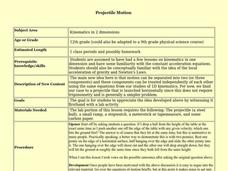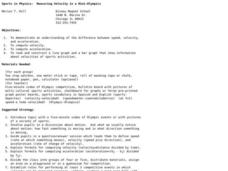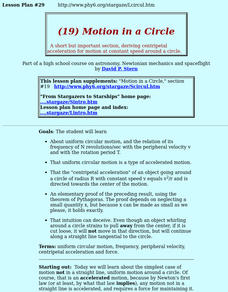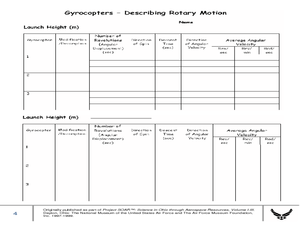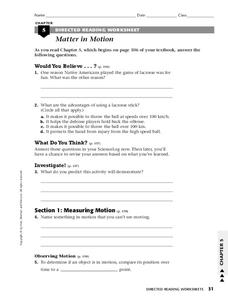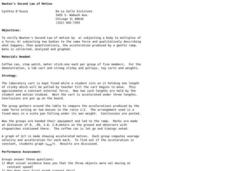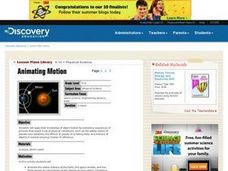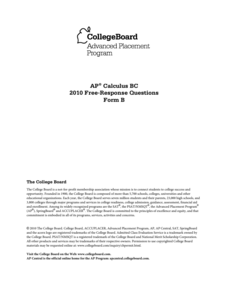Curated OER
Projectile Motion
Twelfth graders experiment with a projectile that is launched horizontally after a demonstration and small discussion about two pennies, one dropping from a table top and the other being slide off the top and hitting the ground at about...
Curated OER
Sports in Physics: Measuring Velocity in a Mini-Olympics
Eighth graders examine the difference between speed, velocity and acceleration. In this velocity lesson students read and construct a line graph and a bar graph to show information about velocities of sports activities.
Curated OER
Motion in a Circle
Students study about deriving centripetal acceleration for motion at constant speed around a circle.
Curated OER
Time and Motion on Track
Students create a motion diagram for a distance and motion project. In this time and motion lesson, students take turns walking around the track and take pictures of their motion. Students measure the distances and determine each...
Curated OER
Gyrocopter - Describing Rotary Motion
Students calculate angular displacement, velocity and acceleration of gyrocopters. In this physics lesson, students compare data taken from 3 different gyrocopters. They explain how differences in construction material affect rates of...
Curated OER
Matter in Motion
For this matter in motion worksheet, students answer the provided questions as it relates to motion, speed, velocity, and acceleration. Students mark given statements as either true or false.
Curated OER
Motion
In this motion worksheet, learners determine the motion of a ball on different inclined planes, including the velocity and acceleration. This worksheet has 8 problems to solve.
Curated OER
Newton's Second Law of Motion
Sixth graders study Newton's second law of motion and verify it. For this force and motion lesson students complete a lab activity and collect data, analyze it and graph it.
Curated OER
Motion Through the Ages
Eighth graders conduct internet research to produce a timeline of man's growth in understanding of concepts of motion and planetary motion through history.
Curated OER
Motion
In this motion worksheet, students complete graphs showing speed vs. time and acceleration vs. time. This worksheet has 2 graphs to complete.
Curated OER
Investigating Motion
Students determine velocity using the slope of a time distance graph. They investigate a motion cart using a CBR unit and a TI 83 calculator setup. Using the graph generated, they calculate velocity.
Curated OER
Animating Motion
Students apply what they recall about objects in motion by animati ng sequences of pictures that model a set of physical conditions. They animate the orbital motions of the Earth, the space shuttle, and the Moon based on calculations of...
Curated OER
Tracking Speed
High schoolers calculate the speed of an object, by measuring the amount of time it takes to cover a given distance, and then divide: speed=distance/time. However, the object may not have been moving at a constant rate over the given...
CK-12 Foundation
Elevator
Do you weigh slightly less when an elevator first starts its descent? The simulation teaches the change in the force based on the acceleration, constant speed, or deceleration of an elevator. Scholars control the mass and acceleration...
Curated OER
Unit VIII: Worksheet 4 - Central Force
Send physics learners into orbit by assigning this seven-problem worksheet. They will calculate the mass of a satellite, construct a force diagram, determine the radius of the orbit, and more. Physics worksheets can become wearisome, but...
CK-12 Foundation
Everglades Airboat
How does an airboat move when there isn't a motor in the water? The simulation teaches the forces related to the thrust and drag on an airboat. Scholars vary the boat mass and thrust force in order to view graphs of the changing force...
McGraw Hill
Gravity Variations Interactive
What would a baseball game look like on the moon? Probably a lot of home runs! A creative activity explores the motion of a projectile on the surface of different bodies in the solar system. Participants adjust the angle and velocity of...
College Board
2010 AP® Calculus AB Free-Response Questions Form B
Most say that practice makes perfect. Scholars use the released free-response questions to practice for the AP® Calculus AB exam. Each question comes with several parts and either do or do not allow calculators. Items include topics such...
College Board
2010 AP® Calculus BC Free-Response Questions Form B
Keep moving along a curve. Two items in the set of released free-response questions from the 2010 AP® Calculus BC exam involve movement along a graph. One involves particle motion along a polar curve while the other uses a squirrel...
College Board
2007 AP® Calculus BC Free-Response Questions Form B
There is just a single real-world problem. Released free-response items from the 2007 AP® Calculus BC Form B contains only one real-world question. The question involves rate of change of wind chill scenario. The mathematical problems...
Curated OER
A Classical & Relativistic Trip to a Black Hole
Students calculate distance, velocity, acceleration and time on their fantasy trip to the black hold. They apply Newton's Laws of Motion and calculate circular motion. They discuss any questions that may arise.
Mr. E. Science
Forces
May the mass times acceleration be with you. The presentation covers forces, Newton's three Laws of Motion, momentum, and vectors.
It's About Time
Automatic Triggering Devices
How does the air bag trigger in an accident? The lesson explores how automatic triggering devices work in automobiles. Using examples such as a seat belt lock and air bag, scholars design their own device to better understand the...
Flipped Math
Calculus AB/BC - Connecting a Function, Its First Derivative, and Its Second Derivative
Uncover what the first and second derivatives reveal about the function. Pupils move beyond sketching graphs to determine what derivatives tell about the function itself. The video reminds learners about particle motion and how to...


